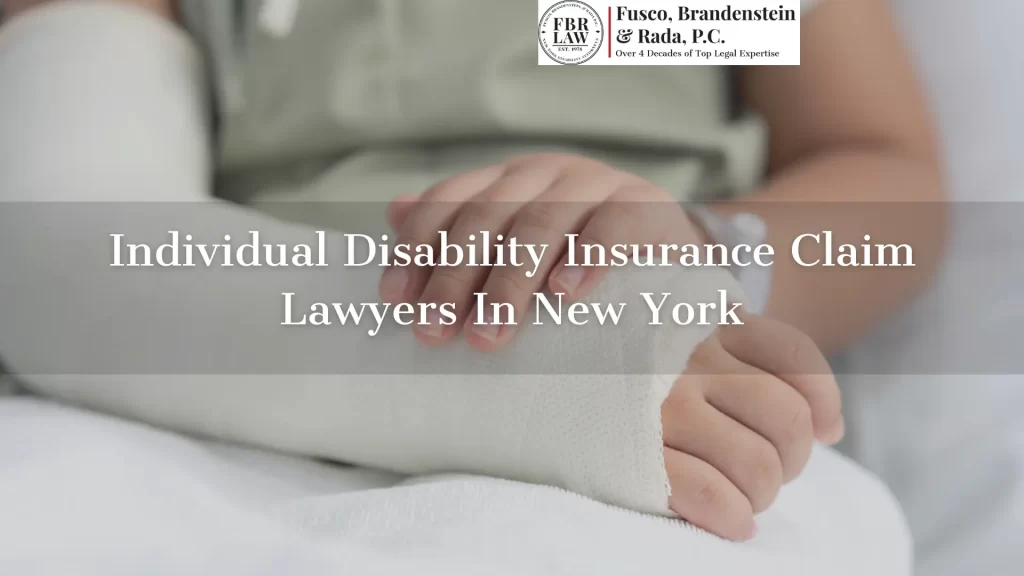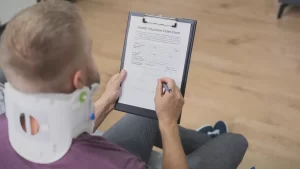
We’ve represented thousands of injured & disabled workers for over 40 years. Did you sustain an injury or illness preventing you from earning an income? Did you purchase an individual disability insurance policy and don’t know what to do next? If so, contact our individual disability insurance claims lawyers in New York, and we’ll assist you with your claim for benefits. Disability insurance replaces a portion of income for workers who can’t return to work due to disabling conditions.
Filing a disability insurance claim? We have the experience and resources to demand fair treatment and maximum payment from the insurance company on your behalf.
Individual disability insurance is for people without coverage through their employer. Some workers also buy it because they want additional protection on top of an existing policy. You must follow state laws if you purchase a plan directly from the insurance company. This is in contrast to employer-paid disability, which falls under federal regulations.
Fusco, Brandenstein & Rada, P.C. will provide support and guidance through the entire claims process. Our individual disability insurance claims attorneys are ready to take your call. We can help you recover the benefits you need to compensate for your losses. Call us today at 516-496-0400 to schedule a free consultation.
What Is an Individual Disability Policy?
Individual disability plans protect someone’s income when they become disabled and can no longer work. You can purchase a short-term or long-term policy by paying a monthly premium directly to the insurance company. Individual policies include special provisions, exclusions, and other factors that could affect coverage. The most common provisions include:
- Noncancellable: The insurance company isn’t allowed to cancel your policy. It also can’t change anything included in the coverage, such as your monthly premium.
- Own-occupation provision: This refers to your eligibility for benefits if a medical condition prevents you from doing your job but not other jobs.
- 90-day elimination period: If you become disabled, you must wait at least 90 days before collecting benefit payments.
Every insurance policy lists qualifying injuries and illnesses. If you can find your non-work-related condition on the list, you’re likely eligible for benefits. Disabilities covered by most individual disability insurance plans include the following:
- Kidney disease
- Musculoskeletal disorders, such as osteoarthritis and rheumatoid arthritis
- Cancer
- Loss of vision or hearing
- Respiratory illnesses, such as cystic fibrosis and chronic obstructive pulmonary disease (COPD)
- Mental health disorders, such as depression, anxiety, and schizophrenia
- Skin disorders, such as psoriasis and eczema
- Neurological disorders, such as Parkinson’s disease and multiple sclerosis (MS)
- Cardiovascular diseases
- Immune system disorders, such as lupus and polymyositis
- Digestive tract conditions, such as Crohn’s disease and inflammatory bowel disease
- Hematological disorders, such as sickle cell disease, thrombosis, and lymphoma
There are also exclusions that could prevent you from coverage if you sustain specific injuries or contribute to your disabling condition. Examples include:
- Alcohol or substance abuse
- Self-inflicted harm
- Criminal behavior
- Civil rebellion or disobedience
- Pre-existing condition
- Accidents occurring on the job
- Normal pregnancy
- Suicide attempt
Short-Term Disability vs. Long-Term Disability
The period when someone collects benefit payments is the benefit period. Short-term policies will provide coverage for a disability that lasts anywhere from three to six months. For long-term benefits, your disability must last longer than a year. These provisions can vary from one policy to the next. You must review your disability plan to determine whether you qualify for short-term or long-term coverage.
Every policy contains an elimination period indicating how long you must wait before your benefits begin. Typically, the elimination period for short-term disability is around 14 days. Long-term disability requires at least 90 days.
The amount and duration of your payments will depend on your average monthly income before the disability occurred. Short-term plans pay up to 50% of an injured worker’s wages for a maximum of twenty-six weeks. For long-term disability, coverage is available at 60% to 80% of pre-injury wages. Payments can last several years or the rest of the disabled individual’s life.
What You Should Do After An Accident Causes a Disability
If you get hurt or sick and develop a disability, you should take specific steps to protect your rights to benefits. Sometimes, insurance companies take months to process benefits claims. You could save some time if you begin the following application process immediately after the incident:
Step 1: Contact your insurance company to notify them of your disability. Do it in writing and make a copy for yourself so there’s a record of it. They will provide a claim packet with instructions for filing a claim and forms you must complete. Be sure that the information you provide is accurate and complete. You could end up with a denied claim if you write down conflicting details or submit an incomplete form.
Step 2: Go to the doctor. They will evaluate your condition and provide a diagnosis. They should write a physician statement that describes your disability. This includes how it occurred, the date it began, and how it affects your job abilities and treatment plan. Follow up with other medical providers and continue medical treatment until they release you from their care.
Step 3: Write an employee statement to include with the application. Most insurance companies require that you complete one.
Step 4: Obtain copies of your medical records and other documents associated with the disabling condition. Evidence can prove that you suffered an injury or illness that keeps you from your job. You can also include a copy of your job description to show the impairments that prohibit you from earning an income.
Step 5: File your claim. Provide all completed forms, medical evidence, and other necessary documentation. Your insurance company will review everything to determine if you deserve benefit payments.
Step 6: Hire an individual disability insurance claims lawyer in New York. We can handle every step of the process on your behalf, so you don’t have to take on the burden alone.
Handling a Denied Claim
If the insurance company denies your disability claim, it’s not the end of the road for you. There are options available to appeal the decision so you receive the benefits you deserve. Fortunately, state laws allow you to file an appeal and provide additional evidence that proves you have a disability.
Your New York individual disability claims attorney from Fusco, Brandenstein & Rada, P.C. will assist you with this procedure. Appeals are complex. They’re even more complicated than the initial claims process. You must comply with deadlines, fill out additional forms, and communicate with the insurance company. We’ll complete a thorough investigation into your injury or illness and collect sufficient evidence to prove you’re unable to work.
If you receive the denial letter, it should include the reason the insurance company denied your claim. It should also have instructions for filing an appeal. We’ll read the letter and documents you sent to determine if anything’s missing or if there’s incorrect information. Crucial evidence we can use to appeal the decision could include the following:
- Affidavits from friends and family who saw the impact of your disability on daily life
- Opinions from vocational, medical, and disability experts
- Copy of your job description
- Records from additional medical treatment and testing performed
- Missing evidence from the original claim
- Physician letters
Common Causes of Denied Individual Disability Claims
 Many people with coverage under individual plans end up with denied claims. Sometimes the insurance company provides a valid reason. Other times, a mistake or oversight might lead to a denial. Some common reasons for denied claims include the following:
Many people with coverage under individual plans end up with denied claims. Sometimes the insurance company provides a valid reason. Other times, a mistake or oversight might lead to a denial. Some common reasons for denied claims include the following:
- You failed to attend a required consultative examination.
- You submitted inaccurate or incomplete documents.
- You have a partial disability instead of a total disability.
- The insurance company is acting in bad faith.
- The insurance company’s doctor disagrees with your initial doctor’s diagnosis.
- The incident that caused your injury or the injury itself is on your policy’s exclusions list.
- Your condition doesn’t match the definition of disability.
Why Choose Fusco, Brandenstein & Rada, P.C.?
Our individual disability insurance claims lawyers in New York have the experience and resources to fight for the benefits you deserve. We’ll use aggressive tactics to ensure the insurance company pays what they owe you. We know you need these benefits to supplement your lost income and afford medical treatment. You can depend on us to build a strong case that gets you the desired results.
At Fusco, Brandenstein & Rada, P.C., we provide our clients with dependable legal services, guidance, and support. We’ll stay by your side throughout the entire claims or appeals process. We have a proven track record of helping disabled workers recover maximum disability benefits. With ten office locations, you’ll never have to travel far to see us. We believe in providing excellent customer service and make sure to return all calls within 24 hours.
Have an individual disability insurance plan and need help filing a claim or appeal while you can’t work? Call our legal team at 516-496-0400 or contact us online. One of our individual disability insurance claims lawyers will meet you for a free consultation to discuss your options. There’s no risk to speak with us about your situation and determine the best path forward.
Related Reading:
